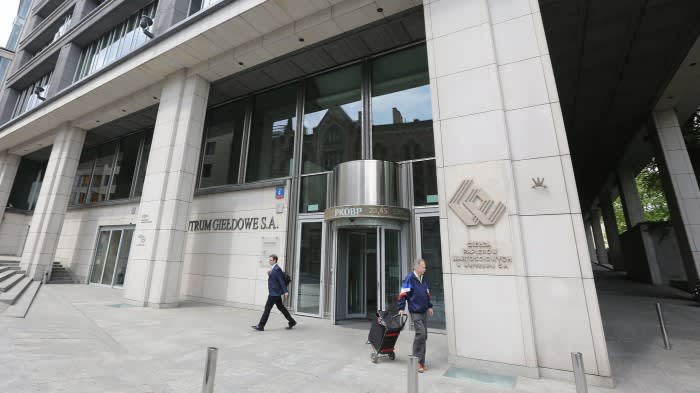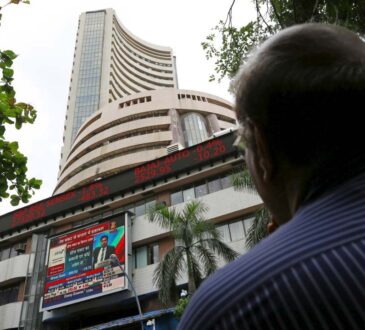
The new head of the Warsaw stock exchange is upbeat that his bourse can recover from a lost decade in which it failed to keep pace with Poland’s booming economy.
Last year the total capitalisation of companies listed in Warsaw dropped to 22 per cent of Polish GDP, compared with 35 per cent in 2013. That has come as fresh initial public offerings have dwindled — Polish parcel locker company InPost opted to float in Amsterdam in 2021, raising €2.8bn — and trading volumes across Europe have fallen away.
In that same period Poland’s economy outpaced its main European partners, most recently with stronger than expected GDP growth of 3.2 per cent in the second quarter from a year earlier.
The stock market’s declining prominence with investors and companies is a marked comedown from a decade ago, when the exchange seemed poised to dominate central and eastern Europe and held merger talks with its longer established Vienna counterpart.
“Unfortunately our stock market has really not kept pace with the growth of our economy,” said Tomasz Bardziłowski, chief executive of the Warsaw exchange, in an interview.

Tasked with reviving Warsaw’s bourse, Bardziłowski was appointed in February by the coalition government of Prime Minister Donald Tusk, two months after Tusk ousted the rightwing Law and Justice (PiS) party.
Bardziłowski sees grounds for optimism, for instance Tusk replacing the management of state-controlled companies listed in Warsaw, notably oil and gas group Orlen, whose share price has fallen 30 per cent over the past five years.
In February, a state audit accused Orlen of selling assets for $1.24bn below their value in order to complete a domestic merger that strengthened Orlen’s position as Poland’s dominant energy company. Last year one of its most prominent foreign investors, Norway’s sovereign wealth fund, warned that Orlen’s purchase of a Polish media business could have “implications for freedom of the press” in Poland because it was seen as mandated by the PiS government.
Without specifically discussing Orlen, Bardziłowski said that “foreign investors got less attracted to our stock market and lost some trust, especially due to concerns related to governance in some state-owned companies.”
Bardziłowski said he was also encouraged by recent media reports that Studenac, a Croatian food retailer, was considering a dual listing in Warsaw and Zagreb, while private equity firm CVC is expected to float its Polish retailer Żabka in Warsaw. With the value of its convenience stores estimated at $8bn, Żabka would be one of Europe’s largest initial public offerings this year.
“Once you have a couple of important IPOs, it creates a momentum and I think there will be more queueing after that,” said Bardziłowski.
However, delistings have recently outnumbered new listings in Warsaw, in part reflecting the growing influence of private equity firms. While working on Żabka’s IPO, CVC separately offered in July to buy out and delist Comarch, in a deal struck with Comarch’s founding family shareholders that valued one of Poland’s main software companies at $650mn.
Some of the exchange’s problems have not been of its own making, such as an outflow of money prompted by a Polish pension reform — dating back to 2013 under a previous Tusk government — that forced pension funds to cut their equity investments.
But some company owners who floated their businesses in the 1990s, after the collapse of Poland’s Communist regime, are also scathing about recent regulation.
Krzysztof Borusowski, president of Best, a debt collection company that floated in 1997, accuses regulators of adding red tape that discouraged companies from listing, rather than encouraging investors by focusing on better regulating problems such as insider trading.
“We completely lost our momentum,” he said. “Our market is now over-regulated, but with a focus on the non-important things.”
Fixing the situation “really requires a solid debate on the purpose of the Warsaw stock exchange”, he added.
As part of the debate, Bardziłowski called for “more tax incentives”, including a reduction in capital gains taxes for long-term investments.
He pledged to launch a long-awaited electronic trading platform before the end of 2025, one year behind schedule. Bardziłowski also hopes Warsaw will start listing real estate investment trusts next year.
“We lost several years in Poland, with no clear strategy on how to attract our own companies and nothing to make foreign capital want to invest here,” said Jarosław Grzywiński, who had a brief tenure as chief executive of the Warsaw exchange in 2017. “If you had a good company with a scalable business, it became normal to look abroad for a more liquid market, like InPost did with its IPO.”
Even if some observers remain sceptical about a quick rebound in Warsaw, most welcome Tusk’s appointment of a CEO who previously worked in equities rather than public administration. Bardziłowski started as a stock market analyst and then managed different brokerage firms.
“You cannot act as if you’re part of the state administration, just sit and wait for clients, you have to be proactive which is something that was not very well understood, not just for the last eight years [of PiS government] but longer,” said Jerzy Kwieciński, who was finance minister under PiS. “I have hope because this guy Tomasz comes from the capital markets and he understands that.”
Eva Sudol, who teaches finance at Harvard Business School, said that Warsaw faced a very difficult challenge to get out of the “chicken and egg” situation of the past decade: “When there is not enough capital flowing in, valuations are low and in turn new companies don’t want to enter.”
The Warsaw exchange needs better marketing, regulations and possibly tax incentives to attract investors, but ironically an improvement could also turn Warsaw into a takeover target, Sudol said. “I think Euronext might love to buy eventually the Warsaw stock exchange.”







